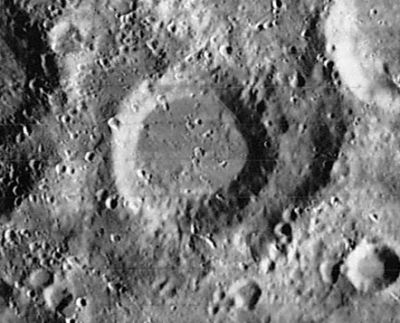Saussure
Contents
[hide]Saussure
|
Lat: 43.4°S, Long: 3.8°W, Diam: 54 km, Depth: 1.88 km, Rükl: 65 |

LOIV 112 H2
Saussure in the centre of (what seems to be) a much larger crater, see also SLC-chart D7 (System of Lunar Craters, 1966).
Images
LPOD Photo Gallery Lunar Orbiter Images Apollo Images
Maps
(LAC zone 112D2) LAC map Geologic map
Description
Description: Elger
(IAU Directions) SAUSSURE.--A ring-plain E. of Tycho, 28 miles in diameter, with bright lofty terraced walls and a somewhat dark interior, on which there is a crater, E. of the centre, and some crater-pits. There are several large depressions on the S.E. wall. It is surrounded by formations which, though nearly as prominent as itself, have not, with the exception of Pictet on the W., and one on the N.E., called Huggins by Schmidt, received distinctive names. The region E. of Saussure abounds in craterlets, some of which are of the minutest type. One of the Tycho streaks is manifestly deflected from its course by this formation, and another is faintly traceable on the floor.
Description: Wikipedia
Additional Information
Depth data from Kurt Fisher database
- Westfall, 2000: 1.88 km
- Viscardy, 1985: 1.9 km
- Cherrington, 1969: 2.1 km
Nomenclature
Horace-Bénédict de Saussure (February 17, 1740 - January 22, 1799) was a Swiss aristocrat, geologist, physicist and Alpine traveller, often considered the founder of alpinism. His early interest in botanical studies naturally led him to undertake journeys among the Alps, and from 1773 onwards he directed his attention to the geology and physics of that region. This work did much to clear up the topography of the snowy portions of the Alps.
A curiosity
What is the purpose of the (not outlined) white "B" between Saussure and Orontius on page 225 of the revised and updated edition of the CLEMENTINE ATLAS OF THE MOON ? - DannyCaes Apr 6, 2016
It's nothing unusual, according to the IAU there is indeed a crater called Saussure B at that location. It's just the absence of the thin black outline around the white "B".
LPOD Articles
Bibliography